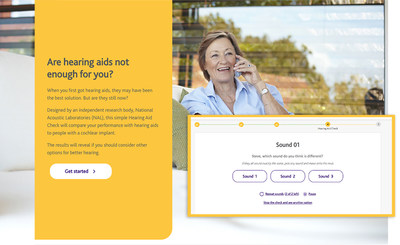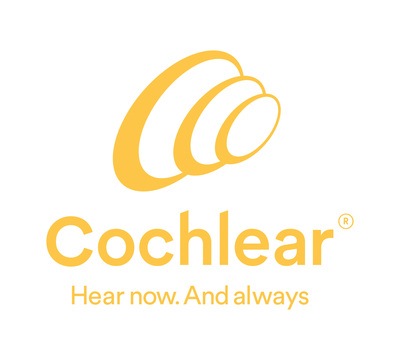New online tool available to check hearing aid performance, help support those who may benefit from a cochlear implant
Cochlear Limited (ASX: COH) has introduced the Cochlear Hearing Aid Check, a new online tool aimed at helping adults with hearing loss determine if they could benefit from a cochlear implant. During Healthy Aging Month, this free tool provides comparative insights between hearing aids and cochlear implants. Notably, research indicates that a significant portion of adults over 50 years old perform poorly with hearing aids. With an increasing prevalence of hearing loss among older adults, this initiative aims to improve awareness and access to effective solutions like cochlear implants.
- Launch of a new online tool for assessing hearing aid performance.
- 93% of participants in the pilot were over 50, indicating strong targeting of older adults.
- Significant improvement in hearing ability reported when transitioning from hearing aids to cochlear implants.
- Only 5% of individuals who could benefit from cochlear implants currently use them.
- 85% of those who took the Hearing Aid Check failed, indicating a need for further intervention.
LONE TREE, Colo., Sept. 9, 2020 /PRNewswire/ -- Cochlear Limited (ASX: COH), the global leader in implantable hearing solutions, is encouraging adults with hearing loss to utilize the Cochlear Hearing Aid Check, a new, free online tool that launches broadly this Healthy Aging Month. The tool allows adults with hearing aids who are struggling to hear to learn if they may benefit from a cochlear implant. The tool aims to help participants, particularly in the aging adult population, compare their hearing performance with hearing aids to people with a cochlear implant, and depending on their results, to seek further hearing healthcare advice to treat their loss.
Take the Hearing Aid Check now: www.HearingAidCheck.com/us.
In the United States, one out of three people over the age of 65 and one out of two people over 75 are affected by disabling hearing loss, but only 5 percent of people who could benefit from cochlear implant hearing technology have them.1,2 Research continues to show aging adults with untreated hearing loss can be substantially affected by social isolation and loneliness with impacts to brain health and quality of life.3
Once hearing loss becomes severe to profound, cochlear implants are the only U.S. Food and Drug Administration (FDA) approved medical solution to effectively treat the loss at that point. Research shows that moving from a hearing aid to a cochlear implant significantly improves hearing ability in noise, including doubling speech understanding.4 However, many adult cochlear implant candidates are not appropriately diagnosed, referred and treated.5 From the initial pilot of the Hearing Aid Check, 93 percent of those who interacted with the Check were over 50 years of age; 81 percent have been diagnosed with hearing loss for over six years; and 85 percent failed the Check, meaning in their hearing aids they performed below or well below the performance of someone with a cochlear implant.6*
"We know there is a significant population of adults who are not getting access to or educated about the benefits of cochlear implant technology. Having the appropriate hearing solution can enable a person to hear speech clearly, which helps keep the brain active and mind sharp so they can continue to live a full, independent life," said Nada Hanna, AuD, CCC-A, Lead Clinical Audiologist, Cochlear Implant Specialist, ENT Associates. "If you do not pass the Hearing Aid Check, there is substantial value in scheduling an appointment with a cochlear implant audiologist to find out if cochlear implants could help you get back to hearing."
The Hearing Aid Check was developed by an independent Australian research body, National Acoustic Laboratories (NAL), in partnership with Cochlear. NAL identified a need for language-independent tests to assess a person's ability to discriminate similar speech sounds. It consists of a minimum of 28 speech sound sets (phonemes - not beeps or words), and up to 81 sound sets presented in background noise. Two sounds are identical, one is different; the participant needs to select the sound they believe is different.
The Check is self-administered and simple to complete for adults 18 and over with hearing loss in both ears who wear hearing aid(s). Participants should find a quiet place and allow 10-15 minutes to complete the Hearing Aid Check at their own pace on a personal computer, tablet or mobile device. Upon completion, participants receive a results summary and recommendations for next steps by email, which can include making an appointment with an audiologist who is qualified on a range of hearing options, such as cochlear implants or more powerful hearing aids.
"The Hearing Aid Check is a first-of-its-kind tool to give adult hearing aid users a baseline assessment of their hearing and provide recommendations to see if cochlear implants could help them hear better than hearing aids alone," said Patricia Trautwein, MA, AuD, Vice President, Product Management & Marketing, Cochlear Americas. "As the COVID-19 pandemic continues to underscore the value of at-home health tools like Hearing Aid Check, hearing health clinics are open and safely serving patients during this time too. Hearing health should continue to be prioritized, especially if a hearing loss is detected, because we know that hearing and connections continue to be essential during this pandemic and beyond."
Cochlear implants are a proven treatment option for those with moderate to profound hearing loss who no longer receive benefit from hearing aids. Cochlear implants have been approved by the FDA for nearly 40 years and are covered by Medicare, most insurance plans and typically Medicaid.**
About Cochlear Limited (ASX: COH)
Cochlear is the global leader in implantable hearing solutions. The company has a global workforce of more than 4,000 people and invests more than AUD
References
- Hearing Loss and Older Adults [Internet]. National Institute on Deafness and Other Communication Disorders; c2017 [cited 19 Sept 2019]. Available from: https://www.nidcd.nih.gov/health/hearing-loss-older-adults.
- Market penetration. This figure is a global estimate based on Cochlear sourced data.
- Brody, J. E. (2018, December 31). Hearing Loss Threatens Mind, Life and Limb. Available from: https://www.nytimes.com/2018/12/31/well/live/hearing-loss-threatens-mind-life-and-limb.html.
- Buchman CA, Herzog JA, McJunkin JL, et al. Assessment of Speech Understanding After Cochlear Implantation in Adult Hearing Aid Users: A Nonrandomized Controlled Trial. JAMA Otolaryngol Head Neck Surg. Published online August 27, 2020. doi:10.1001/jamaoto.2020.1584
- Buchman CA, Gifford RH, Haynes DS, et al. Unilateral Cochlear Implants for Bilateral Severe, Profound, or Moderate Sloping to Profound Sensorineural Hearing Loss. JAMA Otolaryngol Head Neck Surg 2020. Epub ahead of print. doi: 10.1001/jamaoto.2020.0998
- Based on internal Cochlear data. "Hearing Aid Check Reporting, Aug. 2020." Data on file.
The Cochlear Hearing Aid Check is not a diagnostic evaluation and is not intended to replace medical advice. For a complete test or evaluation of your hearing, please consult an audiologist.
* Based on the results of the clinical study conducted by NAL; the average score for those with a cochlear implant is 80 percent. These results assume the participant has been treated by a hearing health professional with appropriately fitted hearing aids.
** Covered for Medicare beneficiaries who meet CMS criteria for coverage. Coverage for adult Medicaid recipients varies according to state specific guidelines. Contact your insurance provider or hearing implant specialist to determine your eligibility for coverage.
Please seek advice from your health professional about treatments for hearing loss. Outcomes may vary, and your health professional will advise you about the factors which could affect your outcome. Always read the instructions for use. Not all products are available in all countries. Please contact your local Cochlear representative for product information.
© Cochlear Limited 2020. All rights reserved.
![]() View original content to download multimedia:http://www.prnewswire.com/news-releases/new-online-tool-available-to-check-hearing-aid-performance-help-support-those-who-may-benefit-from-a-cochlear-implant-301125958.html
View original content to download multimedia:http://www.prnewswire.com/news-releases/new-online-tool-available-to-check-hearing-aid-performance-help-support-those-who-may-benefit-from-a-cochlear-implant-301125958.html
SOURCE Cochlear Limited
FAQ
What is the Cochlear Hearing Aid Check?
When was the Cochlear Hearing Aid Check launched?
What percentage of adults over 50 performed poorly on the Hearing Aid Check?
What are the implications of untreated hearing loss in older adults?









